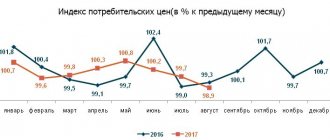What does salary consist of?
First, let’s look at what wages consist of, from the point of view of labor legislation. Thus, Article 129 of the Labor Code of the Russian Federation states that wages may consist of the following parts:
- remuneration for labor depending on the employee’s qualifications, complexity, quantity, quality and conditions of the work performed;
- compensation payments;
- incentive payments (for example, bonuses).
Also, Article 129 of the Labor Code of the Russian Federation discloses such concepts as “salary”, “basic salary” and “tariff rate”. From the definitions it follows that these are fixed parts of earnings. But incentive payments, in their essence, cannot be fixed, since they are designed to stimulate employees. Considering the above, in this article we will mean two components by salary (See Table 1):
Salary components
| I | II |
| Fixed part | Variable part |
| For example, official salary. We also include compensations, bonuses and salary coefficients that are provided for by law and increase the employee’s monthly income. | For example, a bonus for fulfilling a sales plan at the end of the month. We also include here, for example, interest on concluded transactions. That is, in essence, these are payments for achieving results. |
Legal requirements regarding wages
Of course, the Labor Code cannot provide for all the intricacies of the calculation and payment of wages for every enterprise of the Russian Federation, but most of the issues related to the payment of labor relations are taken into account and regulated, providing guarantees and protection not only to employers, but also to employees.
Back to contents
Salary amount
Every year, a minimum wage level is established on the territory of the Russian Federation, or a minimum wage level that is valid throughout the country. From July 1, 2020, the minimum wage is 7,800 rubles. Below this amount, the employer has no right to pay the employee. True, there are also specifics: the minimum level is paid for fully worked standard working hours. Therefore, for example, an employee working part-time (and by law, part-time work cannot exceed half the standard of work at the main place of employment) may receive half as much as other employees. And we are not talking about a reduction in wages, but about payment for the time actually worked.
Otherwise, the employer is free to calculate wages as he sees fit: independently set the amount of bonuses and other incentives, and so on.
In some regions there is a regional coefficient - this amount is also added to the salary.
Back to contents
Deadlines for payment of wages
According to the labor code, wages must be paid twice a month, and the interval between payments should not exceed fifteen days. The employer can choose the dates himself, even the first and sixteenth days of each month, even the tenth and twenty-sixth, even the eighth and twenty-fourth, the main thing is to keep fifteen days between payments and make payments twice a month. The days of payment of wages must be indicated in the documents of the enterprise:
- collective agreement;
- employment contract;
- regulations on wages;
- bonus regulations.
– and in all others if necessary.
Regardless of whether wages are paid to the employee’s plastic card, or given to him in cash through the enterprise’s cash desk, even if there has been a reduction in wages, wages must be paid strictly on the day specified in the enterprise’s documents. If the salary payment deadline falls on a weekend or holiday, the salary must be paid on the weekday before.
Back to contents
Delay in salary payment
Wages cannot be delayed. For each late payment day, the employer must pay compensation to the employee, even if the wages were delayed through no fault of his own. Compensation is calculated depending on the amount of delayed wages (even if the wages were reduced), the refinancing rate of the Central Bank of Russia and the number of days of delay.
If the employer delays payment of wages for more than fifteen days, the employee (if he is not a civil servant, is not dealing with saving the life and health of the population, as well as dangerous work that he has no right to leave) may stop going to work until until the employer pays him off. In this case, of course, the employer will have to pay for downtime days.
If the employer delays wages, the employee can even write a letter of resignation of his own free will for any period, and the employer will be obliged not only to make a full payment on the day of dismissal, but also to agree to any term that the employee puts in the application. The employer does not have the right to reduce wages upon dismissal.
Of course, these actions cannot be performed by the above category of workers, as well as by any workers if there is a military, emergency or other special situation in the country.
Back to contents
Procedure for payment of wages
In order to pay an employee wages, they must first be accrued. Everyone knows that the employee receives an amount that always differs from the salary established for him. And the point is not in lowering wages, but in the fact that workers are required to pay tax on their income - as a rule, it is thirteen percent of wages. In addition, alimony, overpaid wages (due, for example, to a mechanical error by the calculator), and other deductions can be deducted from the salary. But in addition to deductions to the salary, there are also additions:
- bonus based on the results of the billing period;
- bonus for length of service;
- supplement for an academic degree;
- regional coefficient;
- social payments;
- compensation for late payment of wages.
- and so on.
The accrued wages of each employee are indicated in the payroll, after which it is signed by the head of the enterprise (or not signed if he has comments or additions), and only then, on the basis of this document, wages are paid: cash issuance at the enterprise's cash desk or the register is sent employees and the amounts due to them, together with a payment order to the bank for transferring salaries to the employees’ plastic cards.
The procedure for paying wages, its size, payment terms and other nuances of remuneration for employees of the enterprise must be described in detail in the internal documents of the enterprise. Moreover, every employee should have the opportunity to familiarize themselves with them.
Back to contents
Employment contract and bonus clause
The employment contract must specify the terms of remuneration (salary, additional payments, allowances and incentive payments). This is required by Article 57 of the Labor Code of the Russian Federation. Therefore, it should be clear from each employment contract exactly what payments and within what remuneration system the employer is obliged (or has the right) to make to employees.
However, employers also have the right to adopt local regulations (Article 22 of the Labor Code of the Russian Federation), which can establish other payments. Thus, an organization may have a bonus regulation (see “Drawing up a bonus regulation”).
The possibility of reducing earnings largely depends on the total content of these documents (employment contract and local act establishing other payments in favor of employees).
Reducing the variable part of earnings
Let's consider the admissibility of reducing the variable part of earnings using the example of paperwork for a sales manager. So, let’s assume that the employment contract with the manager contains the following wording:
“...the employee is paid a salary in the amount of his official salary in the amount of 50,000 rubles. Bonuses are paid to the employee in accordance with the approved “Regulations on Bonuses”...".
In such a situation, the employer is obliged to pay the manager a monthly salary. But the issue of paying bonuses should be decided on the basis of the bonus regulations. And if this document does not provide for a monthly bonus, then the bonus does not have to be paid.
Other wording is possible in the employment contract, for example:
“...the employee is set a salary in the amount of the official salary in the amount of 50,000 rubles and is paid a monthly bonus in the amount of 40 percent of the official salary, subject to the fulfillment of the sales plan by 100 percent...”
Such language obliges the employer to pay a bonus if the manager fulfills his plan. If you refuse a bonus, this will be a violation of the terms of the employment contract. It turns out that in order to stop paying bonuses you need, at a minimum, to analyze the terms of employment contracts and local regulations of the employer.
Algorithm of actions
Does an employer have the right to reduce an employee’s salary? Yes, if this measure has important evidentiary grounds. In this case, the employer acts according to the following algorithm:
- Notifying employees about an upcoming salary reduction, formulating objective reasons for taking such a measure.
- Obtaining written consent from employees to changes to the provisions of the employment contract.
- Drawing up an additional agreement to the employment contract. The document specifies the new salary amount. As well as grounds for reducing employee wages. If this is relevant, the change in the scope of job responsibilities, working hours, and work shifts is indicated.
- On the occasion of the innovation, an order is drawn up. The document is printed in pairs - for each of the employees and the employer himself.
- The workers must be familiarized with the order and signed.
- That the order and the additional agreement to the employment contract are considered valid in relation to each of the employees only if each of them leaves their signature on these documents.
- From the moment the order comes into force, the employer calculates the salary for its workers according to the updated standards. This can be either the date of publication of the document or another date indicated in it.
Change the bonus regulations
Employers have the right not to approve local acts, but also to cancel or amend them. This fully applies to the provisions on bonuses. Therefore, each employer has the right, if necessary, to issue a decree and order to change this document. In particular, it is not prohibited to change the criteria for paying bonuses and their size. The main thing is that employees are familiarized with the adopted changes upon signature. Please note: if the organization has a trade union, then the changes will need to be agreed upon with it (Part 2 of Article 8 of the Labor Code of the Russian Federation).
Changing the fixed part of earnings
Now let's move on to perhaps the most difficult situation: when the employer wants to reduce the fixed part of the salary (for example, reduce the salary). The difficulty here is that changing the terms of the employment contract is allowed only by agreement with the employee. But not every employee, especially during a crisis, agrees to a salary reduction.
At the same time, the legislation still provides for cases when the terms of an employment contract can be changed at the initiative of the employer. We are talking about Article 74 of the Labor Code of the Russian Federation, which allows for the possibility of changing the terms of an employment contract when “organizational or technological working conditions” change. Let's explain what it is.
What are organizational or technological changes
The Labor Code of the Russian Federation does not contain a closed list of organizational or technological changes in working conditions, in the event of which the terms of employment contracts can be adjusted. Article 74 of the Labor Code of the Russian Federation only provides examples when such a change is possible (for example, with changes in equipment and production technology, with a structural reorganization of production). Also, the resolution of the Plenum of the Supreme Court of the Russian Federation dated March 17, 2004 No. 2 provides another example - the improvement of jobs based on their certification.
Since the list is open, other changes in working conditions can be allowed, for example:
- changes in the organization's management structure;
- introduction of new forms of labor organization;
- changes in the organizational structure with redistribution of workload to other departments;
- introduction of new production technologies.
At the same time, the changes must meet one main criterion: they entail the impossibility of maintaining the terms of the employment contract with the employee. This is required by Article 74 of the Labor Code of the Russian Federation. Moreover, in the event of a dispute, the employer must be ready to prove in court that it was impossible to retain the previous conditions in the contract.
Example
The organization's sales fell. Therefore, management decided to change the procedure for calculating wages for sales managers: reduce their salaries, but increase bonuses for fulfilling the plan. If managers do not agree with the new conditions and go to court, the employer will need to prove that in the current circumstances it was impossible to maintain the previous ratio of salaries to bonuses. However, it will be almost impossible to prove this, since a drop in sales cannot be regarded as an organizational or technological change (Determination of the Moscow Regional Court dated September 14, 2010 No. 33-17729).
You can change the terms of employment contracts, for example, if certain responsibilities are completely removed from employees. For example, when an organization closes one of its activities. Here we can talk about changes under which it is impossible to maintain the terms of employment contracts (after all, some of the employee functions specified in the contracts will simply be meaningless). This situation makes it possible to change the terms of employment contracts and, accordingly, reduce the salaries of some employees.
Please note: when applying Article 74 of the Labor Code of the Russian Federation, the employee’s labor function cannot be changed. That is, even if changes are made to the employment contract, the sales manager must continue to work as a sales manager.
Algorithm of actions
Let's assume that the employer decides to change the terms of employment contracts in accordance with Article 74 of the Labor Code of the Russian Federation. We present an acceptable algorithm of actions in Table 2:
Algorithm of actions of the employer in order to change the terms of employment contracts
| Employer action | |
| Step 1 | Document changes in organizational or technological working conditions (for example, issue an order to close one of the organization’s activities). |
| Step 2 | Issue an order indicating from what date the official salaries of employees will be reduced. |
| Step 3 | Notify employees in writing of the upcoming salary reduction (no later than two months in advance). |
| Step 4 | If employees agree with the reduction, then enter into additional agreements with them on changes to the terms of employment contracts. |
Please note: if the employee who received the notification does not agree with the changes, the employer is obliged to offer him vacant positions that correspond to the employee’s qualifications. If there are no such positions, then a lower position or lower paid job is offered. If the employee is not satisfied with any of the options, then the employment contract with him can be terminated on the basis of paragraph 7 of Part 1 of Art. 77 Labor Code of the Russian Federation.
Reduced wages for workers. Legal methods and risks.
April 4, 2020
The current circumstances and the financial problems that arise from them lead to the fact that in order to restructure their business, companies are looking for ways to reduce their costs and often start by reducing the wages of their employees.
Recently, the number of questions about legal methods of reducing wages has increased from both employers and employees. A significant number of queries have appeared on the Internet: “can wages be reduced without warning”, “salary reduction due to a decrease in the volume of work”, “how to officially reduce wages”, etc.
Let's look at the most common ways to reduce workers' wages and figure out how legal such actions by employers are.
Reducing salaries, tariff rates, piece rates.
The employer can reduce salaries, tariff rates and piece rates established by the employment contract with the employee upon hiring him only with the written consent of the employee - for this he must conclude an additional agreement with him to the employment contract. This option is permissible due to the provisions of Article 72 of the Labor Code. However, even in this case, making these changes to the employment contract will be considered unlawful if it is not justified by relevant reasons (for example, a decrease in the volume of work or job responsibilities of employees, a decrease in the complexity of the work performed, etc.). After all, the salary of each employee depends not only on the agreement of the parties, but also on a number of factors determined by the legislator: on the qualifications of the employee, the complexity of the work he performs, the quantity and quality of the labor expended by him. In addition, the employer is obliged to provide employees with equal pay for work of equal value.
Even if the employee agrees to reduce his earnings, it is necessary to justify the reduction in salary. The agreement between the employee and the employer should state the reason for the salary reduction, justifying this, for example, by reducing the employee’s workload. The only requirement that the Labor Code of the Russian Federation makes for the level of wages, provided that the employee works the full monthly labor standard, is that it should not be lower than the minimum wage.
Therefore, if the salary, tariff rate or piece rates were reduced by agreement of the parties without indicating the relevant reasons, then the regulatory authorities will consider that the employee and the employer had no reason to reduce them.
In practice, there are situations when the employer unilaterally decides to reduce salaries, tariff rates and piece rates due to a reduction in the job responsibilities of employees.
However, as mentioned above, the employer has the right to change downward salaries, tariff rates and piece rate norms unilaterally only if organizational or technological working conditions change, subject to compliance with the standards provided for in Article 74 of the Labor Code.
Reduction in size or non-payment of premiums.
Incentive payments provided for in employment contracts with employees, collective agreements, agreements and local regulations containing labor law standards are an integral part of employee wages. The specified documents establish bonus indicators and conditions for payment of bonuses.
Quite often in these documents there are provisions that the payment of the bonuses specified in them is not the responsibility of the employer or that bonuses are paid only under a certain financial situation of the organization. In this case, bonuses are not included in the remuneration system and are not mandatory for payment. However, it is necessary to remember here that due to subparagraph “n” of paragraph 2 of the “Regulations on the specifics of the procedure for calculating average wages,” these bonuses will not be taken into account in calculating average earnings.
If the organization has established a time-bonus or piece-rate wage system, then the payment of bonuses to employees who have fulfilled all bonus conditions is the responsibility of employers.
Employers cannot unilaterally reduce the amount or completely eliminate such bonuses.
Providing employees with leave without pay.
Recently, one of the most common practices to reduce labor costs is the unreasonable provision of unpaid leave to employees and the establishment of part-time work.
Employers believe that the lack of orders and a reduction in the volume of work are a good reason to send an employee on leave without pay or set him to work part-time. Employees who fear dismissal due to staff reduction are forced to apply for such leave or sign an additional agreement to the employment contract establishing part-time work.
Such actions by the company's management are illegal.
The law does not provide for the right of an employer to unilaterally grant employees leave without pay. In accordance with the provisions of Article 128 of the Labor Code, it is permitted to grant leave to an employee without pay for family reasons and other valid reasons. But when in practice such leave is granted, for example, to all employees of a workshop with a duration of 89 calendar days each, it is difficult to assume that they all simultaneously had family or other valid reasons. Supervisory authorities will definitely pay attention to the provision of unpaid leave to a large number of employees for a long period at the same time.
The Russian Ministry of Labor outlined its point of view regarding the use of these leaves as a tool for reducing labor costs in the explanation “On leaves without pay at the initiative of the employer.” In particular, the Ministry of Labor indicated that “forced” leaves without pay at the initiative of the employer are not provided for by labor legislation.
A part-time working regime can be established upon reaching an agreement between the employee and the employer.
However, the massive introduction of part-time work into organizations, even on the basis of concluded additional agreements to employment contracts, as in the case of the provision of leave without pay, will allow regulatory authorities to doubt the legality of these agreements. The employer has only one legal way to unilaterally establish a part-time working regime - on the basis of Part 5 of Article 74 of the Labor Code. This provision states that in connection with a change in organizational or technological working conditions, the employer, in order to avoid mass layoffs of workers, has the right, taking into account the opinion of the trade union body of the primary organization, to introduce a part-time working regime for a period of up to six months.
In cases where employees are not united in any primary trade union organizations or none of the existing primary trade union organizations unites more than half of the employees of a given employer and is not authorized, in the manner established by this Code, to represent the interests of all workers in social partnership at the local level, at a general meeting (conference) of employees, another representative may be elected from among the employees by secret ballot to exercise these powers.
Introduction of downtime (temporary suspension of work for reasons of economic, technological, technical or organizational nature).
In order for a temporary suspension of work to be considered downtime, the employer must issue an appropriate order, indicating the period of such downtime and its reasons, and also notify the employment service. If necessary, a new order can be issued to extend the downtime. Upon completion, it is also necessary to issue an appropriate order to end the period of suspension of work.
If employees cannot perform the duties stipulated by the employment contracts concluded with them through no fault of their own, then the employer is obliged to pay them for downtime in the amount of at least two-thirds of the employee’s average salary.
However, it is impossible to declare downtime during a non-working month, since V. Putin said in his address that wages for April must be paid in full.
We would recommend entering into agreements with employees regarding salary changes. It is necessary to explain to employees the situation in the company, the lack of funds and the impossibility of continuing work. Since the company has no expected income, it is necessary to warn employees that if they do not agree with the salary reduction, everyone will have to terminate their employment contract. We believe that most employees will cooperate because they do not want to be left without a livelihood.
Transferring an employee to remote work: what you need to know.
Share
Other analytics
September 28
Vertical overview of legislative changes from 09/16/2020 to 09/29/2020
September 15th
Vertical overview of legislative changes from 02.09.2020 to 15.09.2020
August 31
Vertical overview of legislative changes from 08/19/2020 to 09/01/2020
August 17
Vertical overview of legislative changes from 08/05/2020 to 08/18/2020 All analytics
Part-time work
As one of the options for reducing wages, some employers are also considering establishing a part-time working schedule. In particular, the following option is used: let employees work not five days a week, but four. Accordingly, the employer only wants to pay for four days.
However, it should be borne in mind that part-time working with the establishment of a part-time working day and (or) part-time working week can be introduced only if two circumstances exist simultaneously (Article 74 of the Labor Code of the Russian Federation):
- changes in organizational or technological working conditions;
- the possible occurrence as a result of changes carried out by the employer of such consequences as mass layoffs of workers.
If the above circumstances do not exist, then part-time work cannot be introduced.











